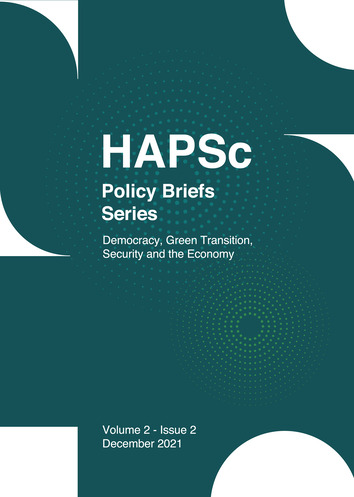Being a Woman under Taliban’s Theocratic Regime
Resumen
In the light of the recent events that have taken place in Afghanistan, the purpose of this policy brief is to turn back to the time when the Taliban were in power (1996-2001) and to explore the brutality of their theocratic regime against women. In particular, this policy brief examines the restrictions imposed by the Taliban on Afghan women, by depriving them of essential rights, as well as the changes that are claimed to have taken place in the post-Taliban era. It is concluded that the international community and NGOs should play a significant role in upgrading the position of women in Afghan society.
Article Details
- Cómo citar
-
Kallini, S. X. (2021). Being a Woman under Taliban’s Theocratic Regime. HAPSc Policy Briefs Series, 2(2), 31–38. https://doi.org/10.12681/hapscpbs.29490
- Sección
- Articles

Esta obra está bajo una licencia internacional Creative Commons Atribución 4.0.
Authors retain copyright and grant the journal right of first publication with the work simultaneously licensed under a Creative Commons Attribution License that allows others to share the work with an acknowledgement of the work's authorship and initial publication in this journal.Descargas
Los datos de descargas todavía no están disponibles.
Citas
Ahmed-Ghosh, H. (2006). Voices of Afghan Women. International Feminist Journal of Politics, 8(1), 110-128.
BBC (2013). Two tales of brutality to women in Afghanistan. December 18. Availale at: https://www.bbc.com/news/world-asia-25398935 (Accessed: 22/10/2021).
BBC (2014). Afghanistan: Before and after the Taliban, April 2. Available at: https://www.bbc.com/news/world-asia-26747712 (Accessed: 19/10/2021).
Bonh, L. (2018, December 8). 'We're All Handcuffed in This Country.' Why Afghanistan Is Still the Worst Place in the World to Be a Woman. Time. Available at: https://time.com/5472411/afghanistan-women-justice-war/ (Accessed: 15/10/2021).
Cole, J. R. I. (2003). The Taliban, Women and the Hegelian Private Sphere. Social Research, 70(3), 771-808.
De Leede, S. (2014). Afghan Women and the Taliban: An Exploratory Assessment. The International Centre for Counter-Terrorism – The Hague 5(1). Available at: https://icct.nl/publication/afghan-women-and-the-taliban-an-exploratory-assessment/ (Accessed: 13/10/2021).
Farhoumand-Sims, C. (2007). Unfulfilled Promises: Women and Peace in Post-Taliban Afghanistan. International Journal, 62(3), 642–663.
Goodson, L. P. (2001). Perverting Islam: Taliban social policy toward women. Central Asian Survey, 20(4), 415-426.
Kabir, N. A. (2012). Women’s position in Afghanistan since 9/11. International Centre for Muslim and non-Muslim Understanding, MnM Commentary No 12. Available at: https://www.unisa.edu.au/siteassets/episerver-6-files/documents/eass/mnm/commentaries/kabir-womens-position-in-afghanistan.pdf (Accessed: 19/10/2021).
Mukherjea, B. (2021). 'Shame on you, world': Women in Afghanistan feel abandoned under Taliban rule. August 19, India Today. Retrieved from: https://www.indiatoday.in/news-analysis/story/afghanistan-women-feel-abandoned-taliban-1842839-2021-08-19 (Accessed: 16/10/2021).
Pikulicka-Wilczewska, A. (2021). Afghan women’s losing battle to remain visible under Taliban. Al Jazeera, October 6. Available at: https://www.aljazeera.com/features/2021/10/6/how-one-afghan-woman-became-invisible-under-taliban-rule (Accessed: 24/10/2021).
Reynolds, M. (2021). As the Taliban returns, 20 years of progress for women looks set to disappear overnight. The Conversation, August 16. Available at: https://theconversation.com/as-the-taliban-returns-20-years-of-progress-for-women-looks-set-to-disappear-overnight-165012 (Accessed: 19/10/2021).
Riphenburg, C. J. (2004). Post-Taliban Afghanistan: Changed Outlook for Women? Asian Survey, 44(3), 401-421.
Skaine, R. (2003). Women in Afghanistan in the Post-Taliban Era: How lives have changed and where they stand today. McFarland & Company.
Snow, L. (n.d.). Unveiled: Women of Afghanistan. Maptia. Available at: https://maptia.com/lalagelsnow/stories/unveiled-women-of-afghanistan (Accessed: 23/10/2021).
Tanner, R. E. S. (1996). Violence and Religion: Cross-cultural Opinions and Consequences. New Delhi: Concept Publishing Company.
US Bureau of Democracy, Human Rights and Labor (2001). Report on the Taliban's War Against Women. US Department of State. Available at: https://2001-2009.state.gov/g/drl/rls/6185.htm (Accessed: 28/09/2021).
Zoya, Follain, J. & Cristofari, R. (2002). Zoya’s Story: An Afghan Woman’s Struggle for Freedom. New York: HarperCollins.



